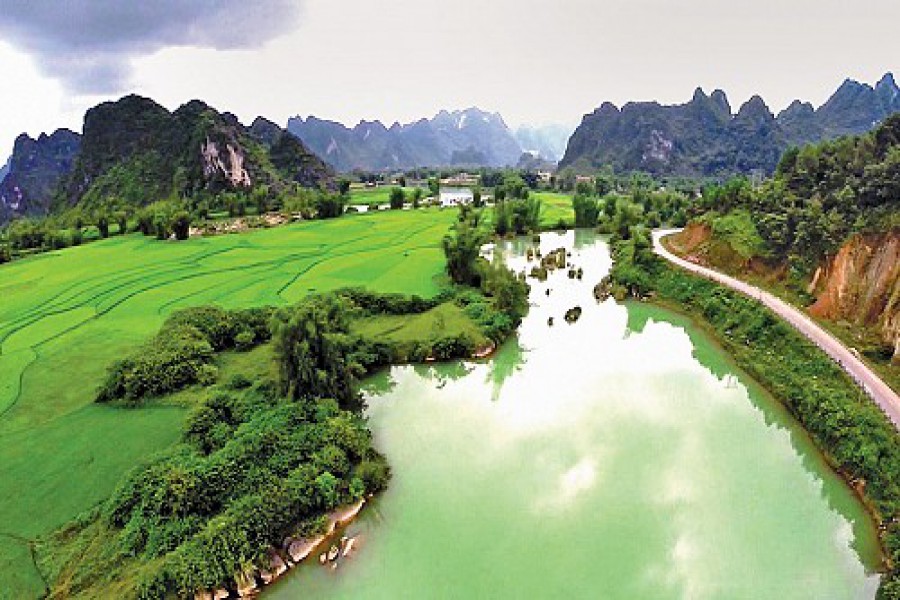Many tourism executives have joined a discussion held by Tuoi Tre(Youth) newspaper on solutions to effectively preserve the natural beauty and traditional features of these regions and the ethnic minority groups there.
Nguyen The Vinh, deputy general director of Saigontourist: ‘Not all provinces need to have their own tourism center’
I think the northeastern and northwestern regions need to have several key tourism centers, which are properly and systematically invested in, to showcase the most distinguishing cultural features of the local ethnic groups to tourists.
Specifically, this approach can be adopted for provinces like Tuyen Quang, Thai Nguyen, Bac Kan, Cao Bang and Ha Giang. The ecosystems in these areas are diverse and reflect the cultural characteristics of many ethnic groups.
We should not set up key tourism centers in every northeastern and northwestern province, as it will lead to similar, overlapping tourism products.

Tourists might spend a very short time in northeastern and northwestern Vietnam, but it will be enough for them to feel and experience the cultural characteristics of the ethnic groups in the regions.
Any plans for tourism development in the two regions must be based on the taste of tourists – market research will help us understand what kind of holidaymakers will visit the region, and what they need.
With this approach, we create tourism products that are typical of the northeastern and northwestern regions, and at the same time, suit the need of vacationers.
Truong Hoang Phuong, general director of Exotic Vietnam: ‘I’m dreaming about a community tour package’
The biggest strength of the northern frontier area is its magnificent natural beauty and the cultural features of the local ethnic groups.
For instance, visitors to A Pa Chai [in Dien Bien Province] can experience a community tour package in which everyone, from a farmer to a soldier, participates in tourism. This means, after having dinner and sleeping at the solider camp, in the morning you can be taken to local mountains by the same soldiers.
In the meantime, for visitors to Ha Giang Province, riding around while sightseeing on a motorbike is already a great experience, enough for them to fully savor all the instinctive features of the two regions.
There are also areas where tourists only need to go on a bus and look through the windows to see the picturesque landscapes, or go to villages to experience the local customs and traditions. Even these simple activities can delight tourists.

What we must do is adequately plan for those destinations, and create tourism products that can best protect the cultural values and natural landscapes in the area, as well as develop tourism in a sustainable way.
Tourism planning in the northwestern region should make Moc Chau [in Son La Province], Dien Bien Phu [in Dien Bien Province] and Sa Pa [in Lao Cao Province] “travel hubs,” from which tourists can continue further to other destinations, as these areas have convenient traffic infrastructure.
The hub for the northeastern region should be Ha Giang Province, and the area north of the Bac Sum Mountain Pass should be the regional culture hub.
In the meantime, besides visiting local attractions, Lang Son Province appears to be where tourists will spend their money on shopping. The remaining destinations in the region should be zoned only for specific, small-scale exploration tours.
Such planning works best for Ha Giang. Even though tourists are crowded, we should not rush to build hotels or other concrete constructions there.
Tran The Dung, deputy director of The He Tre Tourist Co. Ltd.: ‘Tourism will improve local life’
There are many areas in the northernmost frontier provinces where the cultural features typical of the mountainous areas are well preserved, such as Yen Bai Province, Quynh Nhai District of Son La Province. There are also Na Nuong in Lai Chau and Ban Lat in Hoa Binh, home to many generations-old traditional craft villages where tourists will never be disturbed by souvenir peddlers.
At Ban Lat, visitors can freely choose souvenirs and traditional brocade weaving crafts without the storekeepers watching behind. They even have to shout out loud and the owners will appear to collect money.
Tour organizers should let their customers interact with local villagers. They should let their tourists visit the craft villages and encourage them to buy the souvenirs and local specialties there, giving the locals a chance to improve their livelihoods.
This is the only way to help this region sustainably develop.

In my opinion, Son La Province and Na Hang District of Tuyen Quang Province should be key destinations in the region, for they possess not only beautiful natural landscapes but also a traffic system that allows tourists to go to other areas conveniently.
For instance, it is currently very easy to go from the Ba Be National Park in Bac Kan Province to Na Hang, whereas the waterway route between Bac Me District of Ha Giang and Na Hang is also available.
From Na Hang, you can either head north to Dong Van Karst Plateau in Ha Giang Province or go south to Bac Kan Province, from which you can continue exploring Cao Bang Province.
The landscapes in Na Hang are awesome thanks to a combination of both mountainous and riparian beauty.
Even though it is a mountainous district, there are the Gam and Nang Rivers passing through Na Hang. You can also travel along these rivers to reach Tuyen Hoa District of Quang Binh Province.
Na Hang is also home to the habitats of many ethnic groups, who live near the primary forests and lime mountains near the Gam River.
Dao Kim Trang, director of DKT Excursion Co.: ‘Cultural, historical tourism should be tapped into’
To me, we should only develop cultural, historical and ecotourism in the northeastern and northwestern regions.
Looking at the Vietnamese tourism map, we can see three big rings in the north.
The first one is formed by eight provinces that border China: Quang Ninh, Lang Son, Cao Bang, Ha Giang, Lao Cai, Lai Chau, Dien Bien and Son La.
The second ring is in the midland area, consisting of Hoa Binh, Yen Bai, Tuyen Quang and Bac Kan.
The last one surrounds Hanoi: Thai Nguyen, Bac Ninh, Hai Duong and Bac Giang.
Sustainable tourism development should be done in the first eight-province ring, and we should limit the number of visitors to this area.

I sometimes dream of a day when buses can carry tourists to Ha Giang and just stop there, leaving the visitors to freely choose the kind of tourism they want to enjoy: exploring the natural landscapes; getting to know the ethnic community; or experiencing local villages.
It should be required that tourists taking on this type of tourism go in small groups and also have a clear purpose for their travel.
Ha Giang and other provinces should only receive such kinds of tourists, while setting up a center for cultural tourism behind the Bac Sum Mountain Pass.
For tourists who only have a short time to spare but want to experience as much as possible, they can choose Dien Bien Phu [the capital of Dien Bien Province], where there is an airport and a traffic system well linked to other destinations.
Moreover, the landscapes in Dien Bien Phu are also beautiful and the Thai ethnic group there has a rich culture to explore.
This story belongs to a series of articles about Vietnam’s northern frontier region.
 |
 |




